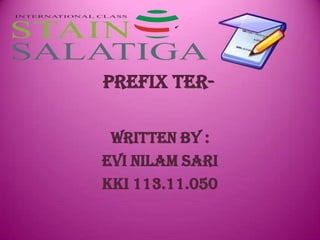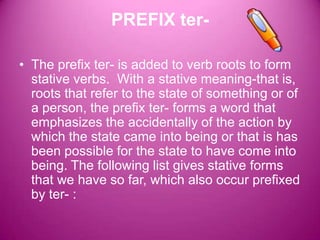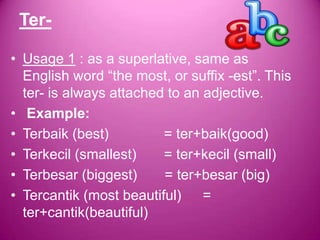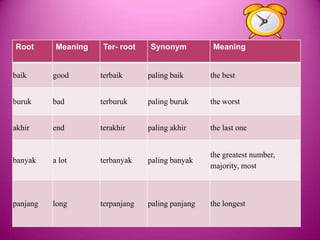Prefix ter
- 1. PREFIX Ter- WRITTEN BY : EVI NILAM SARI KKI 113.11.050
- 2. ? What is sometimes confusing when learning bahasa, are the prefixes and suffixes which are added to the root word. ? Below are some examples and an explanation of the basic rules. ? Don?t worry about learning it all perfectly at the beginning, at least you will be understood. ? And here i would give an example the prefix ter- in bahasa.
- 3. PREFIX ter- ? The prefix ter- is added to verb roots to form stative verbs. With a stative meaning-that is, roots that refer to the state of something or of a person, the prefix ter- forms a word that emphasizes the accidentally of the action by which the state came into being or that is has been possible for the state to have come into being. The following list gives stative forms that we have so far, which also occur prefixed by ter- :
- 4. Ter- ? Usage 1 : as a superlative, same as English word Ī░the most, or suffix -estĪ▒. This ter- is always attached to an adjective. ? Example: ? Terbaik (best) = ter+baik(good) ? Terkecil (smallest) = ter+kecil (small) ? Terbesar (biggest) = ter+besar (big) ? Tercantik (most beautiful) = ter+cantik(beautiful)
- 5. ? Usage 2 : as passive form, similar to di- prefix, but used when the actor is not important. In most cases, it is same as the English ©Ced suffix (or past tense form). ? Example : ? Terbatas (limited) = ter+batas (limit) ? Terbentuk (formed) = ter+bentuk (form) Example in sentence : Bumi terbentuk tiga milyar tahun yang lalu Ī░The earth is formed three billions years ago.Ī▒
- 6. ? Verbs with prefix ter- have three categories: 1. Stative :These verbs refer to a state of affairs and there is no action involved. Root Ter- root Meaning In South Kalimantan there is a floating apung Di Kalimantan Selatan ada pasar terapung. market. letak Koran itu terletak di atas meja. The newspaper is located on the table. tulis Surat itu tertulis dalam bahasa Inggris. That letter is written in English. buat Bajunya terbuat dari sutera. Her dress is made of silk.
- 7. 2. Accidental : Verbs in Indonesian distinguish between accidental and deliberate action. The verb with prefix ter- forms a term for a variety of uncontrolled actions, unintended, unexpected, involuntary or sudden.
- 8. ? Deliberate Tasnya ditinggalkan di kantor. His bag was left at the office. ? Accidental Tasnya tertinggal di kantor. His bag was left at the office.
- 9. It can be transitive or intransitive. ? Intransitive Maman tertidur di kelas. Maman fell asleep in class. Tadi pagi saya terbangun jam lima. This morning I woke at five oĪ»clock. ? Transitive Buku saya terbawa oleh kamu. You took my book by mistake. Obat itu terminum oleh saya. The medicine was accidentally drunk by me.
- 10. ? The prefix ter- is also used to express the passive voice, and the agent is of no importance: Ter- Root ? Penumpang itu terlempar ke laut. ? Kaki orang itu terinjak oleh Ahmad. ? Rumahnya terbakar tadi malam.
- 11. Meaning ? The passenger was accidentally thrown outside. ? The man?s foot was accidentally trampled on by Ahmad. ? The house was burned down by accident last night.
- 12. 3. Abilitative These verbs indicate that the agent has the ability to perform the action. All of them are transitive verbs and usually negated, indicating the inability. Sometimes the agent is not expressed. Ter- root ? Mobil itu tidak terbeli oleh saya ? Suaranya tidak terdengar. ? Persoalan itu akhirnya terselesaikan. ? Kegagalan ini tidak terhindarkan.
- 13. Meaning ? I can?t afford to buy that car. ? Her voice can?t be heard. ? That problem is finally solved. ? This malfunction is unavoidable. ? Notes The prefix ter- is also used to explain the greatest degree of a quality or quantity among two or more persons or things as a superlative form to replace the word ?paling?.
- 14. Root Meaning Ter- root Synonym Meaning baik good terbaik paling baik the best buruk bad terburuk paling buruk the worst akhir end terakhir paling akhir the last one the greatest number, banyak a lot terbanyak paling banyak majority, most panjang long terpanjang paling panjang the longest
- 15. WISE WORD Education is an ornament in prosperity and a refuge in adversity. ~Aristotle~















